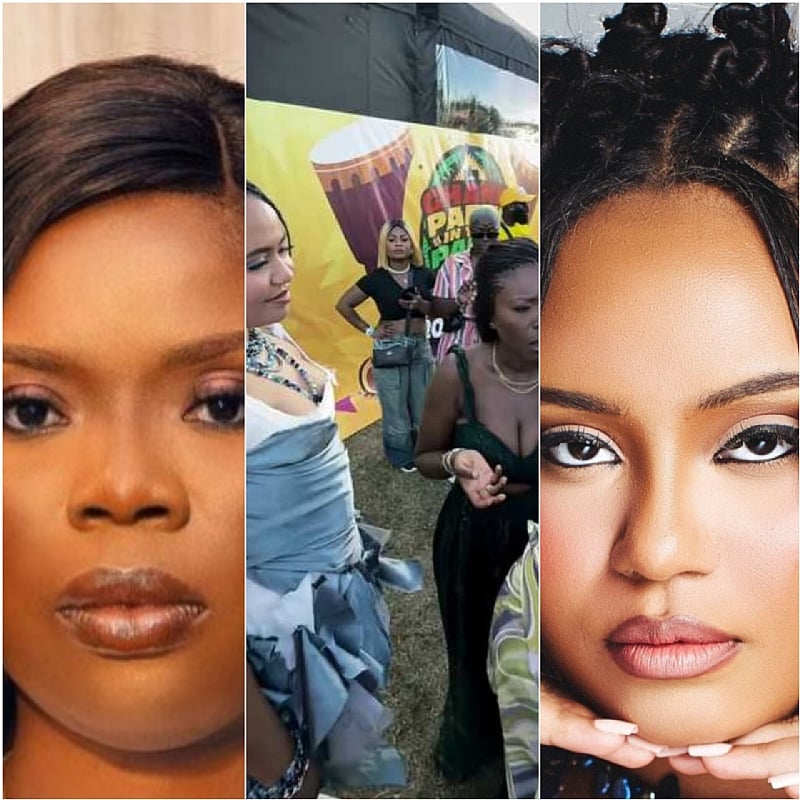The Ghana in the Park event in London, held on July 13, 2025, became the backdrop for a noteworthy interaction between media personality Deloris Frimpong Manso, popularly known as Delay, and Ghanaian-American singer Moliy, accompanied by a friend. This encounter, captured on video and rapidly disseminated across social media platforms, ignited discussions surrounding Delay’s interviewing style and the perceptions held by public figures regarding her show, “The Delay Show.” The incident highlighted the contrasting views on Delay’s approach, with some lauding her directness while others expressed apprehension.
The crux of the exchange revolved around the reputation of “The Delay Show” and the perceived intimidation factor associated with appearing on it. Moliy’s friend articulated a common sentiment, expressing the apprehension that many individuals reportedly feel about being interviewed by Delay. This fear stems from Delay’s well-known interviewing technique, characterized by pointed, often unfiltered questions that delve into the personal and professional lives of her guests. This style, while admired by some for its candidness, has also created a perception of the show as a potentially daunting experience for interviewees.
Delay’s response to the expressed fear was both unexpected and tinged with sarcasm. Her rhetorical question, “Why? Are people unalived there or what?”, directly challenged the notion that her show was a source of intimidation. This dismissive retort, delivered amidst the lively atmosphere of the festival, underscored Delay’s apparent unconcern with the perceived fear surrounding her program. It also served to highlight the divide between those who appreciate her direct approach and those who find it unsettling.
Further defending her show, Delay emphasized the caliber of guests she interviews, citing the example of Nigerian music star Mr Eazi. By referencing a globally recognized artist like Mr Eazi, Delay sought to demonstrate that her platform attracts prominent figures across the entertainment spectrum, not just controversial or struggling celebrities. This assertion aimed to counter the narrative that her show solely focuses on sensationalizing or exploiting the vulnerabilities of her guests, instead positioning it as a platform for engaging with influential personalities from various backgrounds.
The brief interaction between Delay, Moliy, and her friend sparked a broader online debate about the nature of celebrity interviews and journalistic ethics. Supporters of Delay’s interviewing style championed her directness as a form of authentic journalism, arguing that her probing questions allow viewers to gain deeper insights into the lives and perspectives of her guests. They see her approach as a refreshing departure from the often superficial nature of celebrity interviews, appreciating her willingness to address potentially sensitive or controversial topics.
Conversely, critics argued that the fear expressed by Moliy’s friend was valid, given the intensity and sometimes intrusive nature of Delay’s questioning. They contended that the pursuit of a compelling story should not come at the expense of the guest’s comfort or emotional well-being. This perspective raises questions about the balance between journalistic pursuit of truth and the ethical considerations of respecting individual boundaries. The incident highlighted the ongoing discussion surrounding the responsibility of interviewers to conduct themselves with sensitivity while still eliciting insightful responses.
The encounter also placed Moliy in an interesting position. Known for her unique Afro-fusion sound and growing international recognition, Moliy has yet to appear on “The Delay Show.” The public exchange with Delay at the Ghana in the Park event raised questions about whether this interaction might pave the way for a future appearance. Whether Moliy will choose to engage with Delay on her show remains to be seen, but the incident undoubtedly brought attention to the possibility. The online buzz surrounding the encounter could potentially pique the interest of viewers and further fuel speculation about a future interview.
The incident at Ghana in the Park provided a snapshot of the complex dynamics surrounding celebrity interviews and the varying perspectives on what constitutes acceptable journalistic practice. Delay’s unapologetic defense of her style, juxtaposed with the apprehension expressed by Moliy’s friend, encapsulates the ongoing debate about the boundaries and responsibilities within the realm of entertainment journalism. It served as a reminder that while some viewers appreciate the candid nature of unfiltered interviews, others prioritize the ethical considerations of guest comfort and respect. The incident also underscored the power of social media in amplifying such conversations and shaping public perception of media personalities and their interviewing techniques.


